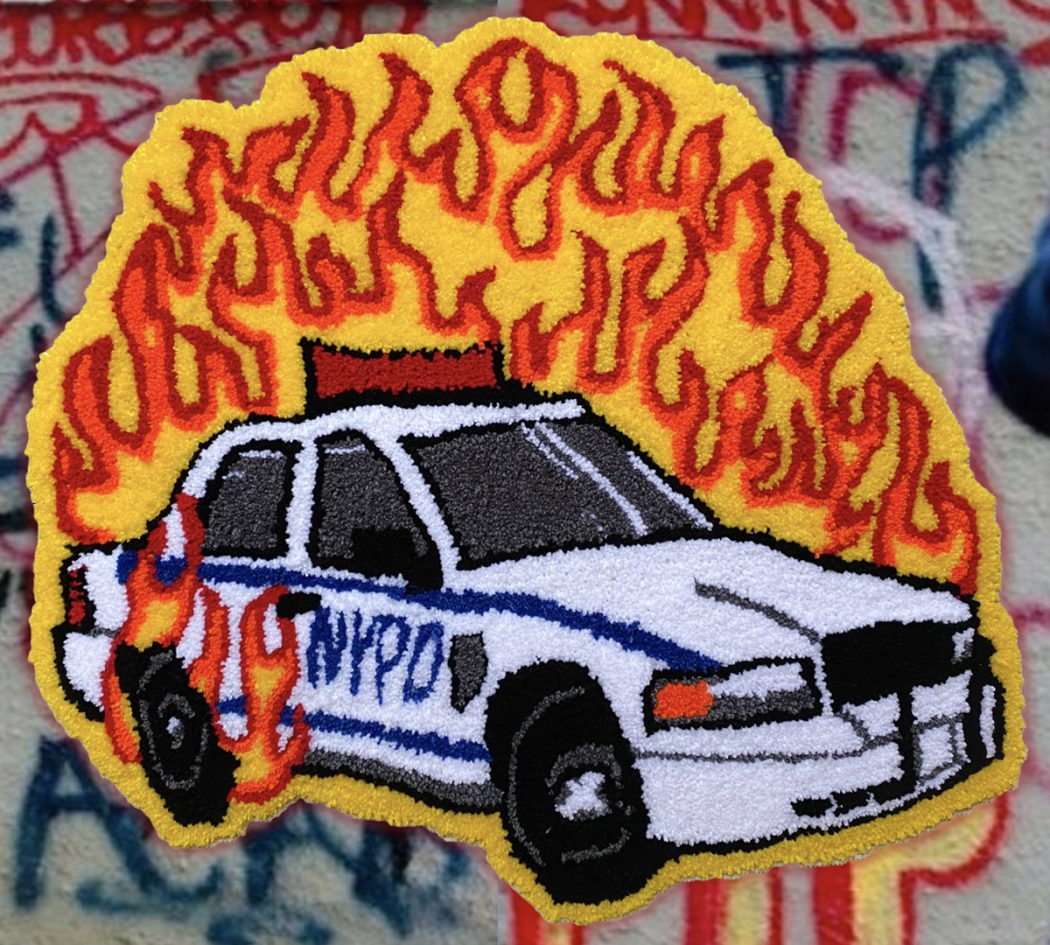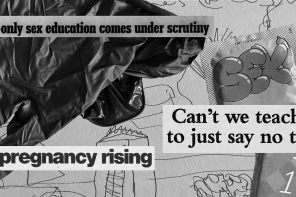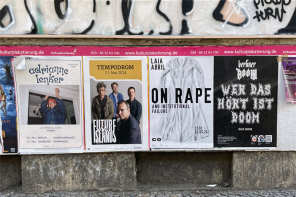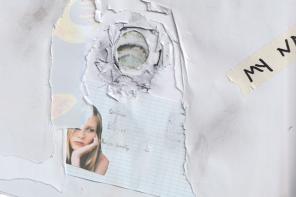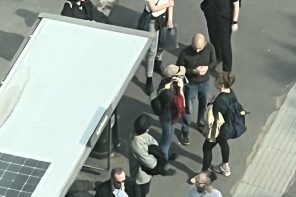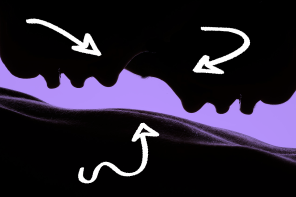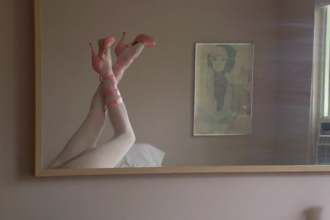Audio transcription:
There has been an influx of social media-driven discussions pertaining to the Uprisings of 2020 in solidarity with Black Lives. Some of these posts and discussions are education-based, with people providing accessible and aesthetically pleasing information related to abolishment politics. However, this tendency to synthesize information in an aesthetically pleasing way has also led to an increase in people consuming resistance as an aesthetic. There has become a market, driven by social media aesthetics, for the radical slogan, a marketing of leftist politics, and therefore, a market for continued oppression. Though graphics elevate and increase the share-ability of messaging, this practice has translated into consumer goods with trendy, relevant, and co-optive messaging.
Type “FTP” in the google search bar, then toggle over to the shopping tab, and you’ll see what I mean. Or “ACAB”, or “Land back”, or “decolonize”, etc. Terms that were meant to be calls to action are now plastered on t-shirts and sold for profit. Or go to Etsy and do the same thing. Even Amazon!
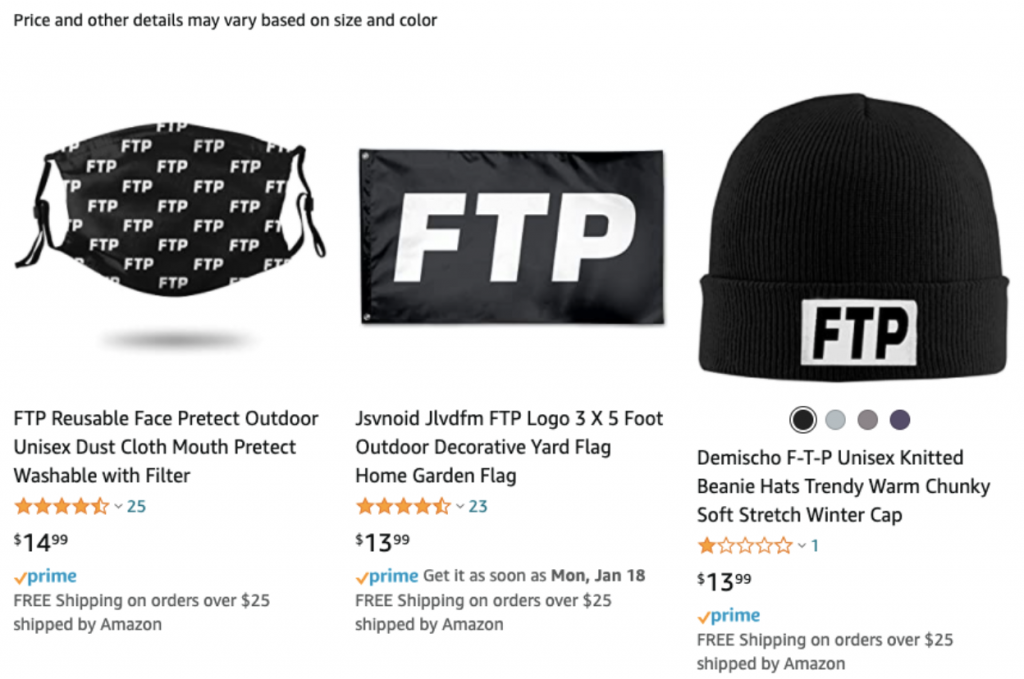
Now, why is this bad? Because aesthetic does not trump oppression. Yes, flagging your political ideology with fashion choices is not a new endeavor, and arguably, is the crux of self-expression through dress. Nonetheless, the lack of critique of this practice is what is causing this irresponsible influx. Colonialism and capitalism are linked; they exist in cacophonous harmony, parasitically living off one another. Capitalism is a part of colonialism, as is continued police violence, and the connection between police violence and racism is obvious to most (I hope). But there is also a connection between capitalism and policing; property and wealth are protected over people’s lives. And that distinction is most grotesquely exercised against Black and Indigenous people, who experience police violence at a higher rate than any other racial groups in the occupied United States.
Therefore, the misuse of calls to action commodified into slogans for profit participates in the very systems the product means to destabilize. Products cannot destabilize systems based on profit; these ideas and materials inherently challenge one another. This is the contradiction so many of us are participating in. We are in fact fiscally and spiritually supporting the continued oppression of people by deadening calls to actions through consumable goods. Not only does this flatten the labor of radical people, these commodities of resistance aesthetic lose their potency when they are ascribed financial value. We devalue community work and organizing when we create for individual or corporate profit.
Calls to action that intend to invite people to unify against continued state violence and the oppression of BIPOC peoples should not be available to commodify for profit, especially under the guise of “allyship”, No matter how aesthetically pleasing they may be. It is sheer disrespect to the work of organizers for designers, companies, or artists, who do not participate in community organizing against the issues they so aptly appropriate, to co-opt oppression into a trendy design. This is how market analysis of supply and demand works, and therefore, how capitalism maintains relevance within leftist artistic circles. I see it, I relate to it, I consume it, and I am no longer focusing on what needs to be done to topple these systems. And I am also guilty of this too; I have an “ACAB” face mask! And yes, my mask flags my political ideologies to particular people, but where was my mask made? Who designed it? Did proceeds go to incarcerated folx? No. None of that. In fact, like many of these trend driven products, it was made in China, bulk purchased, and screen printed by an unknown person, financially benefiting off the labor of police abolishment activists and agitators.
It is time that we no longer put our money where our mouth is; rather, we put action into the things we loosely advocate for with our purchases. Annihilating settler colonialism and capitalism cannot be done by purchasing a hoodie, a mask, or a shirt with “Land back” scrawled across it. No matter how ‘cool’ it is, these purchases will not end oppression; in fact, I am arguing that they perpetuate it. These consumables are not about community organizing for empowerment, but about the trend of resistance. It is trendy to be a leftist. And trend requires that we purchase into it; trend requires capitalism to keep itself relevant for someone’s PROFIT. Often, we advocate for people to ‘shop local’ and support designers, but at what point do we also hold folx accountable for mining trauma for personal gain? It seems that oppression consumption is excusable, as long as it can be made consumable.
Let’s look at an example: Consider LookHuman, a website that, “features over 100,000 unique and fun designs so you can express your unique identity. Whether you are a nerd, science geek, feminista, gamer, punster, fitness nut, or just want to show off your quirky self with our RBG, winosaur, introvert, or LGBT classics.” At LookHuman, “we believe that every printed object can be a mechanism to declare identity and belonging.”
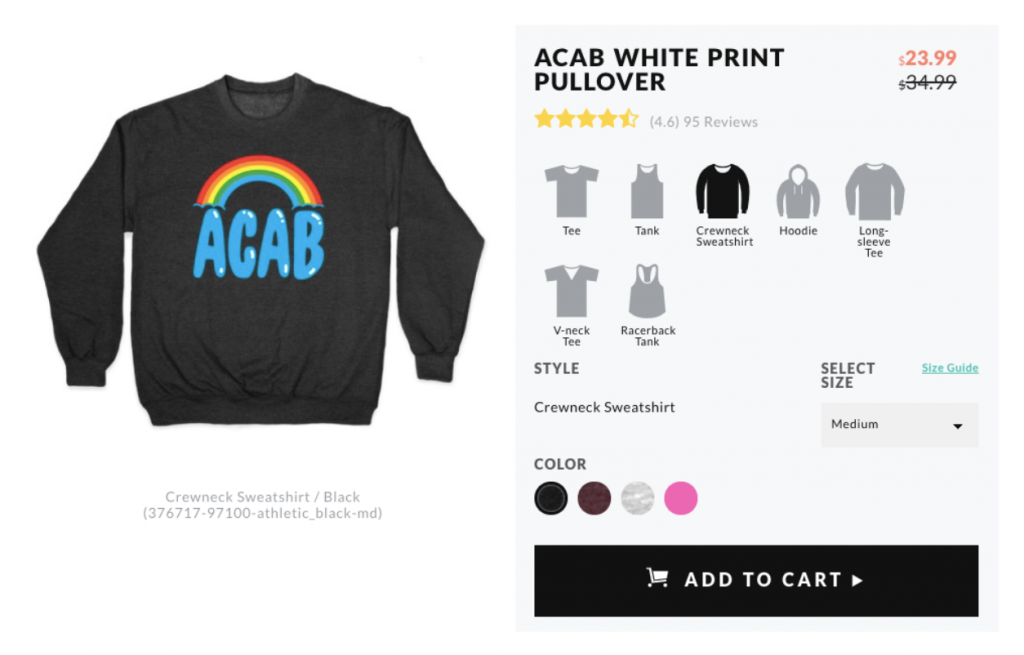
It is this exact capitalist mentality that encourages social media toward mass-produced co-optable graphics which are then available for purchase. Instagram educator, @anarchist.environmentalist, unpacks this phenomena in a thread entitled “Commodifying Resistance” in which they state that, “Liberals co-opt revolutionary social movements by manipulating revolutionary language”; a movement is killed through neoliberal placation by “marketing the purchase of products as revolutionary acts”. These purchases do not actually fight the hierarchies and oppressions being experienced and exercised. Symbolic representation REPLACES the call to action, the FTP shirt replaces actual organizing against the police state. These calls to action become metaphorical, when their intention was to inspire resistance.
I will take this accurate critique by @anarchist.environmentalist further and say that this commodification of resistance aesthetic is done purposefully by ‘leftists’ to avoid actualizing change; I believe it is done on purpose to remain complicit to the colonial lifeways they benefit from. Capitalism truly corrupts, and that is not a coincidence; it is a strategy, and why so many social movements are bastardized and flattened onto mugs and t-shirts rather than acted upon.
In response to this co-option of resistance through trend driven aesthetics, Black Lives Matter: Inland Empire announced their departure from the BLM global network on February 4, 2020. In their open letter, they cited that they were in complete opposition to, “the BLM name…being used to sell products, acquire book deals, TV deals, and speaking engagements”, and that they were opposed to the “movement to substitute Black capitalism for white capitalism.” This open letter poignantly explains the disappointment organizers, especially those of color, are experiencing under the guise of social justice. Movements being co-opted for capitalism is a larger issue than t-shirts and mugs, but this is how and why co-option is so successful when driven by the beast of social-media and clout chasing. A tidal wave of commodification has left people seeking the apex rather than searching for the root of how and why the wave began. For those who need a reminder, our calls to action are for the abolition of settler colonialism, not for clout.
The seriousness of the call to action is quickly drained by an Urban Outfitters-driven aesthetic. It no longer is about acting against oppression, but rather embracing the trend of resistance as marketable. There should be no market for this!
Words by Regan de Loggans
Header Image and Rug by Grace Insogna
Regan de Loggans (They/themme) (Mississippi Choctaw/ K’iche Maya descendant) is a two-spirit activist, art historian, curator, and educator based in Brooklyn on Canarsee land. Their work relates to decolonizing, Indigenizing, and queering institutions and curatorial practices. They are a member of the Indigenous Kinship Collective: NYC. They have staged actions at The Whitney: Biennial, American Museum of Natural History, and on the MTA Subway in response to continued settler colonialism and institutionalized racism and violence.

